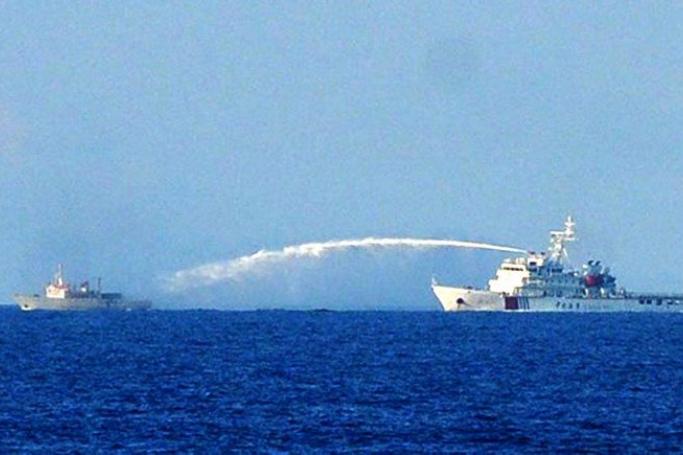Myanmar was founding member of the Non-Aligned Movement and has long embraced a neutral foreign policy, although Western sanctions gave it no choice but to forge closer ties with China in the 1990s.
The improvement in relations with Western powers, and especially the United States, since the change of government in 2011 is a development that will have heartened many senior Myanmar officials because of the balance it helped to restore to the country’s traditionally non-aligned foreign policy.
Strains in ties with China are rare and perhaps a factor in Beijing’s stern response to the deadly bombing March 13 incident on its side of the border from the Kokang region was irritation over the closer relationship that Myanmar has developed with the West during the past four years.
Or perhaps Beijing was angered by Myanmar’s initial response to the bombing, when it blamed the incident on artillery fired by the Kokang rebels rather than the Tatmadaw warplane that China said was to blame.
China’s anger was certainly evident.
State-run Xinhua newsagency reported on March 14 that the vice chairman of China’s Central Military Commission, General Fan Changlong, had issued a warning in a telephone call to Tatmadaw Commander-in-Chief, Senior General Min Aung Hlaing.
If such an incident was repeated, “the Chinese military will take resolute and decisive measures to protest Chinese people’s lives and property,” Xinhua quoted Gen Fan as saying.
Sen Gen Min Aung Hlaing’s response is not known but the government issued a news release the next day that expressed “deep sorrow” for the In the years before the thaw with the West – and the end of pre-publication
censorship – the government was careful to nurture its relationship with Beijing by ensuring that sensitive or negative stories about China were not published.
Some of these decisions suggested that Myanmar was more concerned with maintaining smooth ties with China than showing solidarity with its partners in the Association of Southeast Asian Nations.
An example is a series of decisions made by the censors at the Press Scrutiny and Registration Division of the Information Ministry in 2011 when tensions flared between Vietnam and China over a territorial dispute in the South China Sea.
I was foreign news editor at the Myanmar Times at the time and was often fascinated by the insights that censorship decisions provided about where the government stood on regional and international issues.
The censorship of reports about tensions in the South China Sea in mid-2011 clearly indicated a desire not to irritate China.
Two of the AFP news agency reports I placed on the foreign news pages of the June 13-19, 2011, issue of the Myanmar Times reported Vietnam’s response to the tensions. Two were rejected for publication.
The first was the lead story on the first foreign news page, on page 17. It was headlined: “Tensions soar in the South China Sea”. The intro, with a Hanoi dateline, said: “Vietnam protested to China on June 9 after what it claimed was a “premeditated” attack on an exploration ship in its waters, but Beijing hit back, warning its neighbour against violating its sovereignty”.
The second rejected story was another response to the situation from Vietnam that I had placed as the lead story on the Asian news pages, on page 23. It was headlined: “VN says territory is ‘incontestable’. The Hanoi-datelined intro said: “Vietnam is determined to protect the “incontestable” sovereignty of two South China Sea archipelagos, the prime minister said in a report on June 9, intensifying a war of words with China.
Juxtaposition can be a powerful layout device for highlighting differing points of view and next to the report headlined “VN says territory is ‘incontestable’, I placed a story about a speech given by China’s then Defence Minister Liang Guanglie at the Shangri-La Dialogue security forum in Singapore on June 5, 2011.
The report was headlined: “China will never be a threat, minister tells security talks.”
It was approved for publication.
A few weeks later there was more pandering to China in reports about the South China Sea.
Rejected from the July 18-24 issue of the Myanmar Times was a report headlined: “China rejects RP call”. It was a call by Manila to refer the South China Sea territorial disputes to the International Tribunal for the Law of the Sea.
In the same issue was a report quoting China’s then top military officer, General Chen Bingde, as saying that the timing of US naval exercises in the South China Sea was “inappropriate”.
It was headlined: “China criticises timing of US naval exercises”. It was approved for publication.
This Article first appeared in the March 26, 2015 edition of Mizzima Weekly.
Mizzima Weekly is available in print in Yangon through Innwa Bookstore and through online subscription at www.mzineplus.com
You are viewing the old site.
Please update your bookmark to https://eng.mizzima.com.
Mizzima Weekly Magazine Issue...
14 December 2023
Spring Revolution Daily News f...
13 December 2023
New UK Burma sanctions welcome...
13 December 2023
Spring Revolution Daily News f...
12 December 2023
Spring Revolution Daily News f...
11 December 2023
Spring Revolution Daily News f...
08 December 2023
Spring Revolution Daily News f...
07 December 2023
Diaspora journalists increasin...
07 December 2023
School teachers to help at polling stations in Myeik












